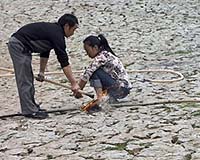 |
Washington (AFP) March 29, 2010 The decline in the US bee population, first observed in 2006, is continuing, a phenomenon that still baffles researchers and beekeepers. Data from the US Department of Agriculture show a 29 percent drop in beehives in 2009, following a 36 percent decline in 2008 and a 32 percent fall in 2007. This affects not only honey production but around 15 billion dollars worth of crops that depend on bees for pollination. Scientists call the phenomenon "colony collapse disorder" that has led to the disappearance of millions of adult bees and beehives and occurred elsewhere in the world including in Europe. Researchers have looked at viruses, parasites, insecticides, malnutrition and other environmental factors but have been unable to pinpoint a specific cause for the population decline. The rough winter in many parts of the United States will likely accentuate the problem, says Jeff Pettis, lead researcher at Department of Agriculture's Bee Research Laboratory in Beltsville, Maryland. Winter figures will be published in April. But preliminary estimates already indicate losses of 30 to 50 percent, said David Mendes, president of the American Beekeeping Federation. "There are a lot of beekeepers who are in trouble" he said. "Under normal condition you have 10 percent winter losses.. this year there are 30, 40 to 50 percent losses." He said the phenomenon probably results from a combination of factors but that the increased use of pesticides appears to be a major cause. "I don't put my bees in Florida because the last couple of years there has been tremendous increase in pesticide use in the orange crop to fight a disease," he said. "It's a bacterium and the only way to control this disease is to use pesticide... a few years ago they did not use any pesticide at all." He said that pesticide use "has changed dramatically" and has made beekeeping "more challenging." Research conducted in 23 US states and Canada and published in the Public Library of Science journal found 121 different pesticides in 887 samples of bees, wax, pollen and other elements of hives, lending credence to the notion of pesticides as a key problem. Pettis said the finding of pesticide residue is "troubling." "It might not be the only factor but it's a contributing factor," he said. The best thing to help bees, he said its "to try to limit habitat destruction," leaving more natural areas in agriculture and in cities such so honey bees can have "a diverse natural environment." Ironically, he said the problem stems from expansion of agriculture to feed the world. But in destroying bee populations, that can hurt crop production. "The world population growth is in a sense the reason for pollinators' decline," he said. "Because we need to produce more and more food to feed the world and we grow crops in larger fields. A growing world means growing more food and to do that we need pollinators. And the fact that the world is continuing to grow is the driving force behind the habitat destruction."
Share This Article With Planet Earth
Related Links Farming Today - Suppliers and Technology
 Farmers' futures evaporate in China drought
Farmers' futures evaporate in China droughtQixingcun, China (AFP) March 29, 2010 Peasant farmer Dong Guicheng wakes up every morning hoping for rain, but each day a crippling drought instead brings more disappointment and desperation. In a scene repeated by millions of people in a vast area of China's parched southwest, Dong treks daily to a dwindling reservoir to fetch scarce water for his walnut and chestnut trees, which have seen almost no rain for half a year. Hi ... read more |
|
| The content herein, unless otherwise known to be public domain, are Copyright 1995-2010 - SpaceDaily. AFP and UPI Wire Stories are copyright Agence France-Presse and United Press International. ESA Portal Reports are copyright European Space Agency. All NASA sourced material is public domain. Additional copyrights may apply in whole or part to other bona fide parties. Advertising does not imply endorsement,agreement or approval of any opinions, statements or information provided by SpaceDaily on any Web page published or hosted by SpaceDaily. Privacy Statement |